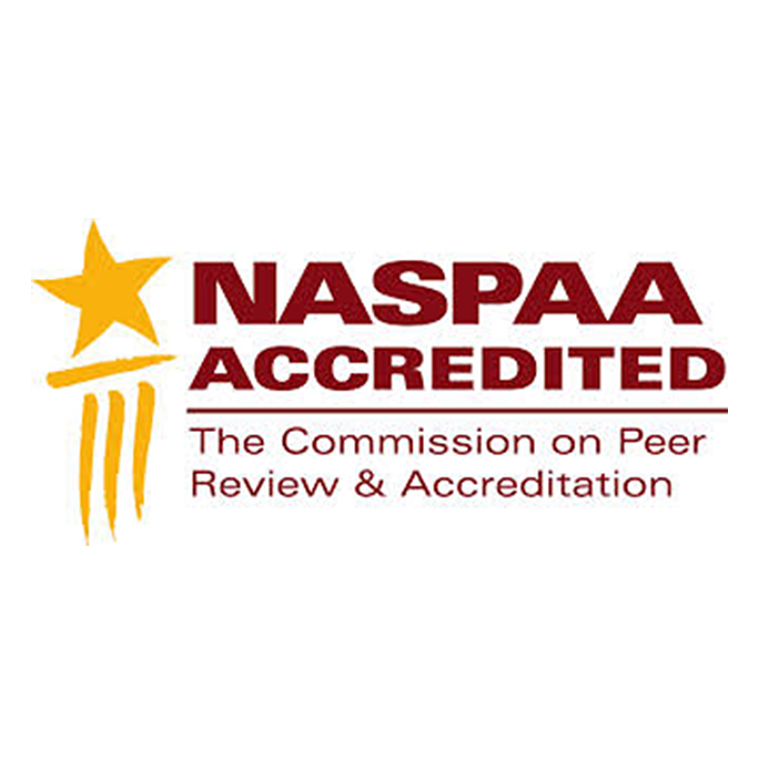With an MPA from the O’Neill School, your education builds on five decades of growth and scholarship. The O’Neill School is one of the largest and most-respected schools of its kind, consistently recognized as one of the best among all Master of Public Affairs programs.
Earn your MPA from a leader in public affairs education
98%of reporting 2022-23 MPA residential masters students go into employment, military, or continuing education upon receiving their degree
Your degree, your way
In-residence
Join us on the IU Bloomington campus. This 48-credit hour program can be completed in two years.
Online
100% asynchronous classes. Complete coursework on your own time from anywhere. See our online program.
D.C. Accelerator
Combine our in-residence MPA with an immersive one-year experience in Washington, D.C.
100% of O'Neill master's students are considered for funding.
Competitive funding packages are available to assist in making our top-ranked school affordable. Email us about funding your degree.
Application deadlines
Spring term
- International: October 1
- Final: November 15
Fall term
- Priority deadline: January 15
- International: March 1
- Final deadline: May 1*
*Deadline has been extended to July 1
MPA overview
Description of the video:
"Indiana University is one of the best choices I've ever made, and I wouldn't change a thing about it. People here want you to succeed; the faculty is going to cheer you on, your classmates are cheering you on.
It's a place where you meet people who want to change the world, and that's what makes O'Neill special, because the friends that I've met today, they'll be my network tomorrow.
The foundation that O'Neill helped me build in my career is invaluable. I made professional connections that helped me not just launch my career, but to this day I run across O'Neill alumni in my daily work.
The MPA at the O'Neill School prepares our students to work in any sector, whether it be public, nonprofit, or for-profit private organizations. Our core curriculum is extraordinarily rigorous, but we also have very in-depth concentrations and rich experiential opportunities for our students throughout their program.
O'Neill students provide value; they're able to hit the ground running because O'Neill focuses on instilling good skill sets like the quantitative and the qualitative analysis. The challenges that we're faced with today, they're not one-dimension. The way that students are taught to think at O'Neill allows them to provide creative solutions.
At O'Neill I gained skills that helped me bridge the gap between theoretical and empirical, and strategic and practical. You're hearing from faculty who are at the top of their profession, but you're also spending a lot of time with practitioners. That practical focus is something that is really unique to the MPA experience at O'Neill.
My degrees [are] tailored to teach students how to be leaders, how to solve the next problems affecting society. I look forward to running for office back in Kenya; someday I hope to produce the first African president from O'Neill School.
We very much pride ourselves at the O'Neill School with having one of the most flexible MPA programs possible. Students are allowed to take classes both online or residentially, we have numerous concentrations so students can specialize in what they're most passionate about, we have numerous electives, and you can even create your own specialized concentration.
People want to take advantage of the best program in the country and all the benefits that come along with it, but you don't become the best by just having the best curriculum; you've got the best faculty, you've got the best facilities, you've got the best peers and students, and you've got the best network. You've got 50 years of alumni in the market, you've got 50 years of civic and state and federal investment all coming together.
As an employer, O'Neill's students are incredibly desirable because not only have they demonstrated a mission-driven orientation, [but] they also have a broad base of knowledge that spans all of the various business acumen that could be necessary in running an organization.
O'Neill students are a different breed; they're driven, they're outgoing, they're passionate, and they want to lead for the greater good, so when you meet someone who's in the O'Neill School, you know that they're going to change the world and make it a better place."
Let's talk about your options and career goals!
Connect with a current student
Speak with one of our student ambassadors about their O’Neill experience.
Learn to lead for the greater good
Our interdisciplinary nature sets us apart. It’s a program based on doing, designed to prepare skilled, principled, and creative leaders.
You’ll learn how to address society’s complex, interconnected problems through a traditional public administration and policy analysis curriculum blended with recent academic advances in leadership and governance. And, you’ll graduate with the skills you will need for a career in any sector—public, private, or nonprofit.
- American Red Cross, Manager
- Booz Allen Hamilton, Energy Communication Specialist - Senior Consultant
- Chicago Housing Authority, Senior Energy Analyst
- Crowe Horwath LLP, Healthcare Consultant
- Cummins, Corporate Responsibility Program Manager
- Deloitte, Business Technology Analyst
- Federal Election Commission, Campaign Finance Analyst
- GAO, Analyst
- Grant Thornton, Global Public Sector Associate
- Habitat For Humanity, International Senior Analyst
- Indiana Department of Environmental Management, Project Manager - Wetlands, Lakes, and Streams
- National Alliance on Mental Illness, Development Associate
- Nestle, Safety Health and Environmental Specialist
- New York City Department of Education, Co-Director, Mastery Collaborative
- PWC, Management Consultant Senior Analyst
- The Nature Conservancy, Urban Conservation Program Associate
- U.S. Agency for International Development, South Syrian Assistance Platform Program Management Assistant
- U.S. Department of Homeland Security, Immigration Officer
- United Nations, Project Assistant
- United States Environmental Protection Agency, Presidential Management Fellow and Environmental Protection Specialist

“I have had one-of-a-kind opportunities to learn from and research with world-renowned professors and scholars in the energy and environmental policy fields. The MPA program has equipped me with applied skills to lead for the greater good and make a difference in my community.”
Jona Jaha, MPA’23
Project Manager at Kosovo Local Government Institute
Consider a dual degree
Pair your MPA with another master's degree from O'Neill, IU Bloomington, or our global partner, Seoul National University, to expand your career possibilities. With an MPA dual degree, you'll earn two master's degrees in less time than it would take to earn each degree separately.
 The Indiana University Paul H. O’Neill School of Public and Environmental Affairs’ Master of Public Affairs program is accredited by the Network of Schools of Public Policy, Affairs, and Administration (NASPAA).
The Indiana University Paul H. O’Neill School of Public and Environmental Affairs’ Master of Public Affairs program is accredited by the Network of Schools of Public Policy, Affairs, and Administration (NASPAA).
To foster a distinguished community of principled, creative, and skilled practitioners and leaders who serve the public good from an interdisciplinary and global perspective.
We will achieve this by:
- Instilling the interdisciplinary knowledge and skills needed to effectively address problems through objective and evidence-based analysis, implementation, and evaluation of policies;
- Positioning our graduates to excel in the public, non-profit, and private sectors where they contribute to the public good by addressing social, economic, environmental, and governance challenges efficiently, effectively, and equitably;
- Developing students from diverse backgrounds who can understand and manage the complexity and dynamics of contemporary issues in public affairs;
- Fostering and modeling professional ethics such as fairness, compassion, accountability, transparency, and respect for the rule of law;
- Producing high-quality policy-oriented research and professional service that focuses on significant issues in public affairs, and creating innovative opportunities for students to learn from and collaborate with leading scholars and practitioners.
Our public service values:
- Being dedicated to service in the public interest, and contributing to the public;
- Utilizing skills and creativity to address public problems;
- Exhibiting professional ethics, including accountability and transparency;
- Using resources efficiently and responsibly;
- Acting with caring and compassion, demonstrating equity and fairness, and respecting views expressed by citizens and public servants; and
- Upholding the public trust and democratic ideals, such as the rule of law, the protection of individual liberties, and intellectual freedom.
Competency #1: To lead and manage in the public interest
Definition: To understand and improve how organizations operate individually and collectively to address social, economic, environmental, and administrative problems. To understand different forms of governance and how they are used in partnerships across public, nonprofit, and private sectors to advance the interest of society.
Learning outcomes:
- To analyze situations that involves interaction between the public, nonprofit, and private sectors.
- To use theory and models of organizational behavior, while taking into consideration the political, institutional, legal, and ethical context and other environmental constraints.
- To discern the impact of leadership styles and cultural values on organizational operations.
- To appropriately apply strategic decision-making techniques and models.
- To identify and demonstrate understanding of the characteristics of successful leaders.
Competency #2: To participate in and contribute to the policy process
Definition: To use knowledge and skills to effectively address social, economic, environmental, and administrative problems through appropriate policy processes.
Learning Outcomes:
- To identify the structure, function, and similarities and differences between the public, nonprofit, and private sectors, the legal frameworks in which the sectors operate, and how each sector affects the public policy process.
- To utilize the results of appropriate quantitative or qualitative methods to inform decision making in the policymaking process.
- To effectively identify stakeholders and develop strategies to collaborate with them.
Competency #3: To analyze, synthesize, think critically, solve problems, and make evidence-informed decisions in a complex and dynamic environment
Definition: To develop quantitative and qualitative skills to address policy problems and inform decision making within the policy process.
Learning Outcomes:
- To collect, analyze, interpret, and present data using appropriate models and methods.
- To apply critical-thinking skills to the resolution of public problems.
- To understand the politics of the policymaking process; role of politics in determining the kinds of policies that are adopted.
Competency #4: To articulate, apply, and advance a public service perspective
Definition: To develop awareness of individual and organizational responsibility and service to the public and one's organization, and a commitment to ethical practice and professional excellence.
Learning outcomes:
- To recognize legal, political, economic, and cultural constraints on policy formation and program administration.
- To develop the knowledge and skills necessary to take personal responsibility for performing one's work in an ethical and professional manner.
Competency #5: To communicate and interact productively and in culturally responsive ways with a diverse and changing workforce and society at large
Definition:To communicate and work effectively and in diverse settings. Dimensions of diversity include, but are not limited to, age, culture, ideology, race and ethnicity, religion, and sexual orientation.
Learning Outcomes:
- To communicate effectively with an understanding of diverse institutional and cultural norms.
- To work effectively in a diverse team and deal effectively with conflict.
- To comfortably and respectfully discuss societal problems and solutions with diverse groups.



